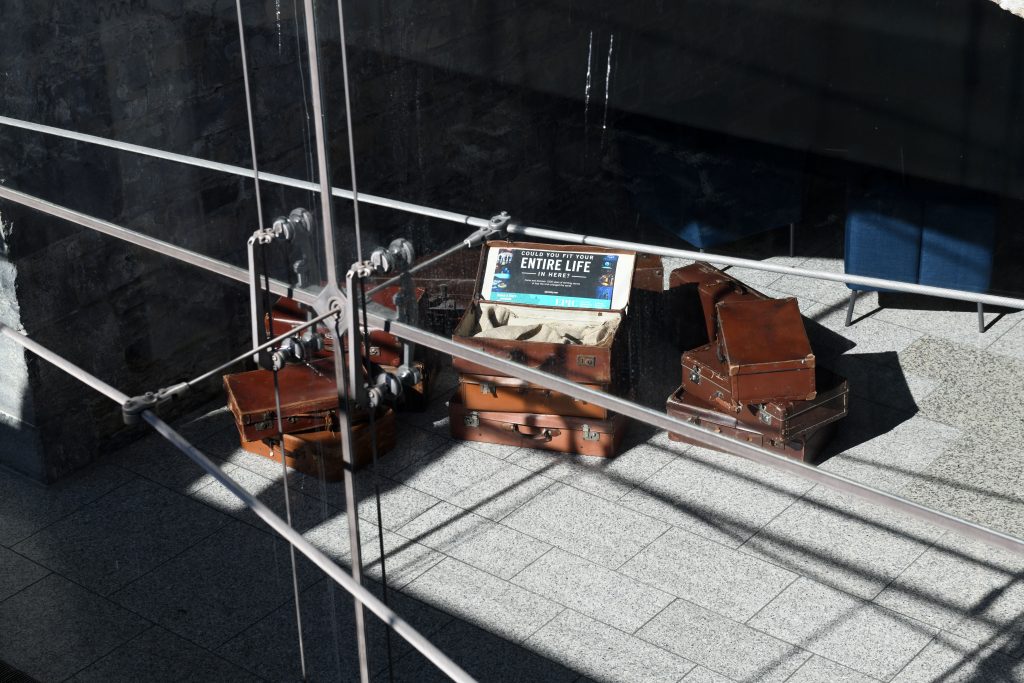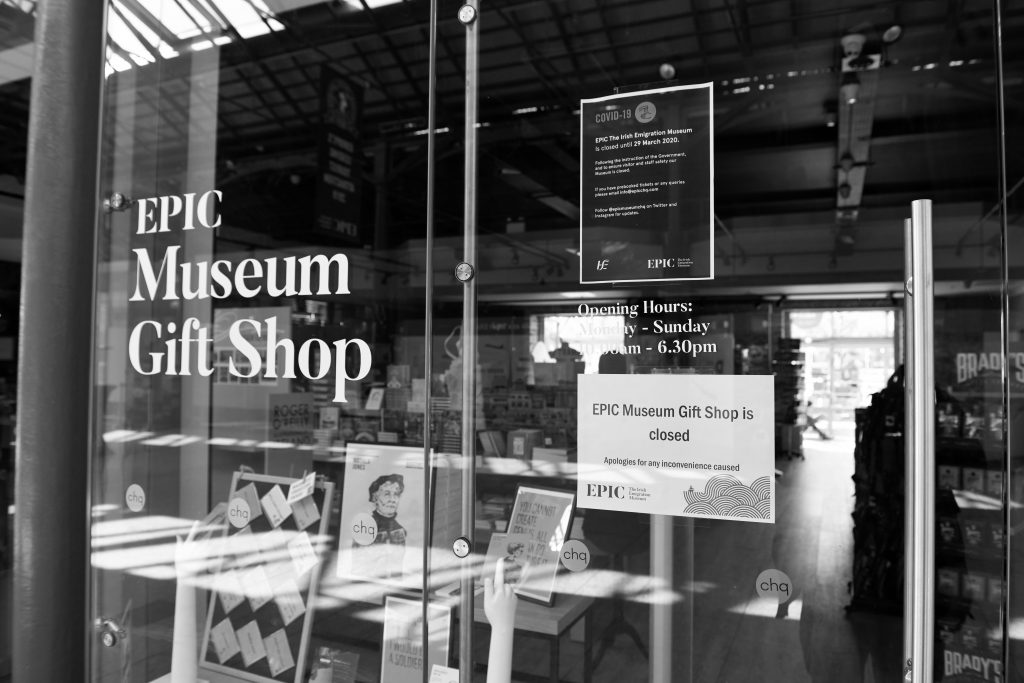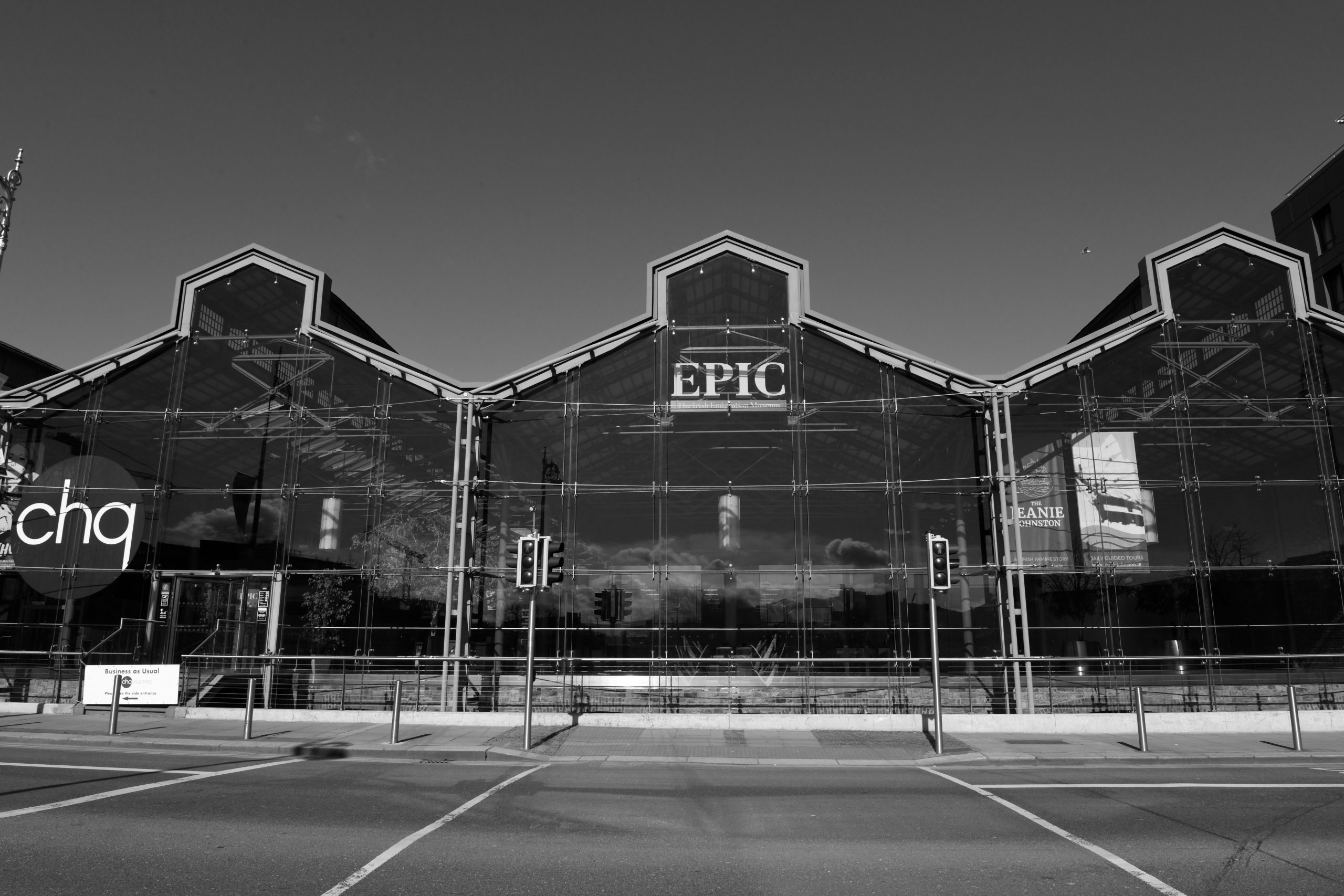The gift shop at EPIC, the Irish emigration museum in the iconic CHQ building at the heart of Dublin’s docklands, was the last section of the business to shut down on Saturday. Exhibition spaces were already closed for a week to prevent the spread of Covid-19. When The Currency first got in touch at the end of last week, the plan was to pay staff until the end of March, but the rules around government supports at the time meant uncertainty reigned beyond that.
The wage subsidy scheme announced by ministers on Tuesday evening has brought EPIC’s Museum Director Patrick Greene some way out of the dark. “I’m very pleased this has emerged from it,” he said. While it will take more time to work out the details and determine how long the museum can keep its 70 employees on payroll, one thing is now clearer: “It allows us to expand the length of time we can keep people not only in contact with the museum, but also working on projects for when we go live again,” said Greene.
Up until now, businesses losing their income to health restrictions could lay off their employees while keeping them on payroll and pay them a €203 weekly unemployment benefit, to be refunded on a “next day” basis under a scheme administered by the Revenue Commissioners. The intention of this refund scheme unveiled last week was to keep employers and employees connected, while avoiding delays and complications in the registration of large numbers of newly unemployed workers.
“I’m desperate to get back on site and see people enjoy the museum.”
Patrick Greene
The crisis has evolved at such speed that by the time its terms and conditions were published last Friday, they were already out of date. On the one hand, the scale of job losses means that dropping take-home pay to €203 per week for hundreds of thousands of workers would still hit the wider economy with a massive demand shock. On Tuesday, Minister for Finance Paschal Donohoe recognised the need to “support income to keep those in work at work and by doing so, build economic demand and get ready to rebuild our living standards in our immediate future”.
On the other hand, it was too restrictive for businesses like EPIC. While its revenue is entirely dependent on visitors, shop sales and space rental for events and has dropped to zero, the company is healthy and was willing to dig into its reserves to top up the dole payment and keep employees busy, if not on full duty.

EPIC is backed by its founder, former Coca Cola Chair and CEO Neville Isdell. Management acknowledges this makes it more secure than many other tourism businesses hit by the pandemic, and letting staff go would be the last thing they would do. For the initial two weeks of the shutdown, the museum redeployed workers to conduct a range of tasks from deep cleaning and maintenance to research on future exhibitions.
To keep this going, however, the museum relied on a share of their wages to be covered by the refund scheme. “The initial advice form government was that they would help businesses keep people employed, but this seems to have changed in the two days to the details being published,” Greene said on Friday. “There is no middle ground where you can keep money in people’s pockets while they’re still working, albeit part-time,” EPIC’s finance director Mervyn Greene echoed at the time.
*****
This all changed when Taoiseach Leo Varadkar, Donohoe, Minister for Business Heather Humphreys and Minister for Social Protection Regina Doherty spoke successively to detail new income supports at 4pm on Tuesday.
“To encourage employers and companies badly affected by the emergency to keep staff on the payroll, a wage subsidy scheme will be introduced to co-fund 70 per cent of salaries up to a maximum of €38,000 a year, so for a salary of €38,000, the subsidy will equate to €410 a week in take-home pay,” Varadkar said.
In practice, employers that can justify a minimum 25 per cent drop in turnover or inability to pay normal wages due to Covid-19 and keep their February employees on payroll will receive a tax- and PRSI-free payment covering up to 70 per cent of their take-home pay to pass on to their staff. For incomes between €38,000 and €76,000, the subsidy will be capped at €350 per week, according to a formula to be worked out by the Revenue Commissioners, Donohoe added: “This will provide tapered support up to €76,000.”
Subject to emergency legislation being passed by the Oireachtas between Thursday and Friday, the minister committed to the measure for 12 weeks starting this Friday.

Back at EPIC, Mervyn Greene was watching the press conference anxiously. The duration of the measure came as a positive surprise, he said. “If companies can re-open within 12 weeks, the first week will be slow,” he warned, with the wage subsidy still available to help them ease back into activity if needed.
While Museum Director Patrick Greene highlighted the uncertainty surrounding the duration of the pandemic in Ireland, he welcomed the role of the wage subsidy in helping EPIC get ready to bounce back whenever things improve. “It is very good support,” he said. “From a personal point of view working from home, I’m desperate to get back on site and see people enjoy the museum.”
More restrictions, more supports… more debt
Varadkar warned that restrictions now extended until April 19 could last for “weeks, if not months” and listed a new series of businesses affected from this Wednesday:
- Theatres, clubs, gyms, leisure centres, hairdressers, betting offices, marts, markets, casinos, bingo halls, libraries and other similar outlets must remain closed;
- Hotels must restrict occupancy to essential, non social and non-tourist reasons;
- Non-essential retail outlets must close to the public. The Government has published a list of essential retail outlets allowed to remain open including food, health and safety, fuel, hygiene and office supplies providers;
- Cafes and restaurants should only offer takeaway or delivery. The Taoiseach acknowledged more work was needed to deal with those without planning permission for those services.
- Sporting events including those behind closed doors, such as horse racing until now, are cancelled.
- Playgrounds, holiday and caravan parks will close.
- Cruise ships will no longer have access to Ireland.
- Places of worship are to restrict numbers to ensure physical distancing.
- On construction sites, the Government will “work with employers and unions” to determine conditions for continued activity, taking into account essential building on health facilities.
“The impact of Covid-19 on our economy and employment has been sudden and will be enormous,” Varadkar said.
In addition to the 70 per cent wage subsidy scheme, the Government announced an increase in the emergency unemployment benefit for those laid off and self-employed workers losing their income as a result of Covid-19 from €203 to €350 per week in recognition of their “massive and sudden change in living standards,” Donohoe said. The illness benefit for those self-isolating as a result of the disease will also increase to €350, with all members of a quarantined household eligible.
Taken together, Donohoe estimated these measures to cost €3.7 billion over the next 12 weeks. “There will clearly be a significant impact on public finances,” he added, “but we must act now to avoid an even greater economic challenge in the future.”
In addition to business supports previously announced, mostly under the form and loans from state agencies and leniency in Revenue enforcement, the Government announced a deferral of local authority rates for the most immediately affected businesses, primarily in the retail, hospitality, leisure and childcare sectors, until the end of May.
This means increased public debt in the coming months and possibly years as the minister said the Exchequer surplus recorded as we entered the year has already been exhausted by the combined rise public health expenditure and dwindling tax take resulting from the pandemic. Yet he was confident that Ireland would not meet difficulties in raising the finance required.
Donohoe hinted at the next battle centred on cost mutualisation at EU level as he headed into a Eurogroup videoconference on Tuesday night, to be followed by a similar remote meeting of EU heads of government on Thursday: “How can countries can pay for their response to a virus that knows no boundaries and knows no national borders? We’ll need to engage with each other regarding how we can do that.”


